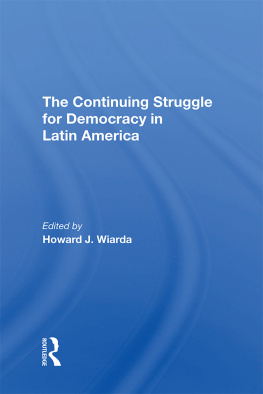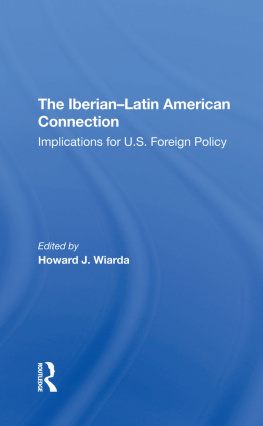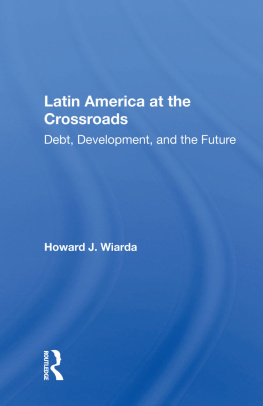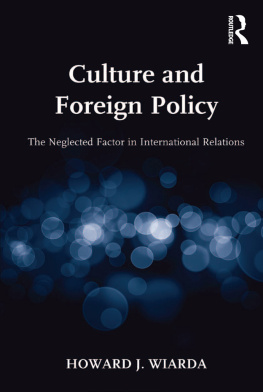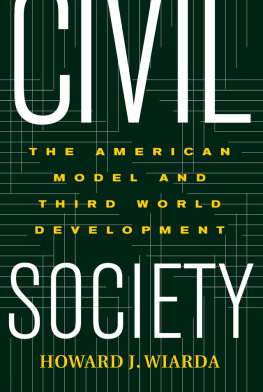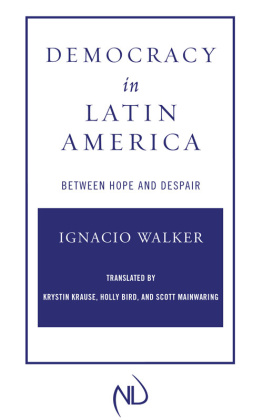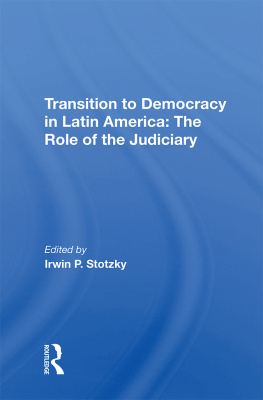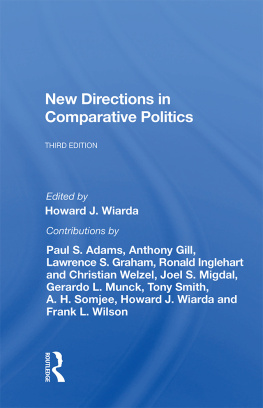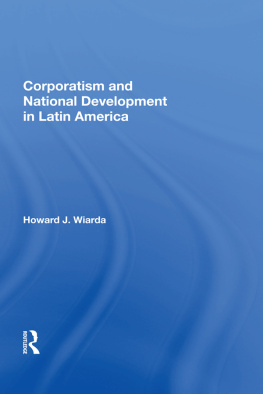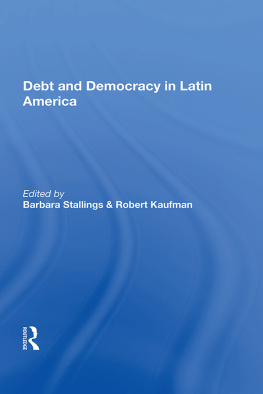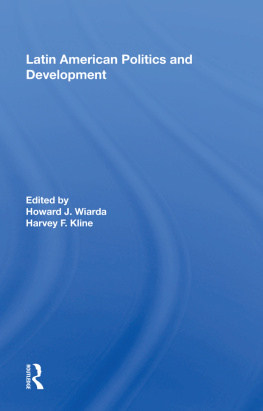The Continuing Struggle for Democracy in Latin America
Other Titles in This Series
Brazil: Foreign Policy of a Future World Power, Ronald M. Schneider
Mexico's Economy: A Policy Analysis with Forecasts to 1990, Robert E. Looney
The Future of Brazil, edited by William H. Overholt
The Politics of Chile: A Sociographical Assessment, Csar Caviedes
Technological Progress in Latin America: The Prospects for Overcoming Dependency, edited by James H. Street and Dilmus D. James
Westview Special Studies on Latin America and the Caribbean
The Continuing Struggle for Democracy in Latin America
edited by Howard J. Wiarda
This integrated collection of original essays evaluates and assesses whether democracy is viable in Latin America and, if so, how and in what form. The authors examine the significance, for both Latin America and the United States, of the dominance of authoritarian political systems in most Latin American countries; explore the implications of assessing Latin America through our own liberal-democratic and often ethnocentric biases; and discuss whether it is possible to derive a theory of democracy from the Latin American experience, rather than our own. In the process, they survey Latin America's historic quest for democracy, focusing on the various groups and elites involved in the struggle and assessing the policy failures and potentials of the 1960s, 1970s, 1980s, and beyond.
Howard J. Wiarda is professor of political science, adjunct professor of labor relations, and chairman of the Program in Latin American Studies at the University of Massachusetts.
The Continuing Struggle for Democracy in Latin America
edited by Howard J. Wiarda
Coauthored by:
Lee C. Fennell
William L. Furlong
Lawrence S. Graham
Jack W. Hopkins
Michael J. Kryzanek
Paul H. Lewis
Anthony P. Maingot
Ronald C. Newton
Neale J. Pearson
Ida Siqueira Wiarda
Howard J. Wiarda
First published 1980 by Westview Press, Inc.
Published 2019 by Routledge
52 Vanderbilt Avenue, New York, NY 10017
2 Park Square, Milton Park, Abingdon, Oxon OX14 4RN
Routledge is an imprint of the Taylor & Francis Group, an informa business
Copyright 1980 Taylor & Francis
All rights reserved. No part of this book may be reprinted or reproduced or utilised in any form or by any electronic, mechanical, or other means, now known or hereafter invented, including photocopying and recording, or in any information storage or retrieval system, without permission in writing from the publishers.
Notice:
Product or corporate names may be trademarks or registered trademarks, and are used only for identification and explanation without intent to infringe.
Library of Congress Cataloging in Publication Data
Main entry under title:
The Continuing struggle for democracy in Latin America.
(Westview special studies on Latin America and the Caribbean)
Essays in honor of Harry Kantor.
Bibliography: p.
1. Latin AmericaPolitics and government1948. Addresses, essays, lectures. 2.
DemocracyAddresses, essays, lectures. 3. Kantor, Harry. I. Wiarda, Howard J., 1939
II. Fennell, Lee C. III. Kantor, Harry.
F1414.2.C623 320.98003 79-13551
ISBN 13: 978-0-367-29103-7 (hbk)
To Harry Kantor Mentor, Inspiration, Colleague, and Friend From his former students
Contents
Part 1
Introduction: A Perspective and Framework
, Howard J. Wiarda
Part 2
Long-Range Perspectives on the Quest for Democracy in Latin America
, Howard J. Wiarda
, Ronald C. Newton
Part 3
Group Politics and Democratic Pluralism in Latin America: Prospects and Weaknesses
, Neale J. Pearson
, Ida Siqueira Wiarda
, Michael J. Kryzanek
, Jack W. Hopkins
Part 4
Has Democracy Failed?
, William L. Furlong
, Paul H. Lewis
, Lee C. Fennell
Part 5
Is Democracy Still Viable?
, Anthony P. Maingot
, Howard J. Wiarda
, Lawrence S. Graham
Part 6
Conclusion: The Continuing Struggle for Democracy in Latin America
, Howard J. Wiarda
Democracy in Latin America seems everywhere to be threatened, not only by the recent rash of military coups and widespread violations of human rights but also by a whole new body of literature that questions whether "democracy" is the goal toward which Latin America aspires or whether the presumed "struggle" for it is the best and most appropriate way to approach the area. And yet, throughout the hemisphere, the democratic mythos remains very much alive, the struggle for democratic participation and freer societies still goes on, and the aspiration for democratic development continues to constitute a major societal goal. Democracy is under attack, but it is certainly too early to sound its death knell; and a group of younger scholars has recently sought to revive the democratic dream by arguing that while democracy as North Americans conceive it may be fading throughout Latin America, the efforts by Latin Americans to devise democratic structures more in keeping with their own history and cultures constitute both a hopeful and a progressive sign.
Harry Kantor has been one of this country's foremost champions of democracy in Latin America, but as a scholar and teacher he was consistently wise and foresighted enough to see that democracy would have to come on Latin America's own terms rather than on the institutional bases of U.S.-style democracy. Harry Kantor was a remarkable scholar and teacher in the area of Latin American politics and society who, prior to his recent retirement as professor of political science and of Latin American studies at Marquette University, had a long and distinguished career at the University of Florida and in its Center for Latin American Studies. Professor Kantor was a close personal friend and student of Haya de la Torre and the Peruvian Apristas, of Jos Figueres and Liberatin Nacional, of Rmulo Betancourt and Actin Democrtica, of Juan Bosch and the Dominican Revolutionary Party, and of Luis Muoz Marn, Galo Plaza, Arturo Frondizi, Jess de Galndez, and a host of other democratic leaders.
Harry Kantor helped discover and make known the ideas of the Latin American democratic-Left long before they became fashionable and was one of the area's strongest spokesmen for a social-democratic reformism. Professor Kantor was an advisor and intimate friend of a dozen Latin American presidents and scores of party heads and labor leaders, and his research on Latin American politics made him one of the foremost scholars of his generation. In addition, Harry was an inspiring, colorful, dynamic, outspoken, and controversial mentor and teacher who spent more time and dedication on his students than anyone most of us have ever encountered. He produced, particularly during that period of the 1960s when Latin American studies at the University of Florida and elsewhere were at their height, a remarkable number of young Ph.D.s who have by now risen to prominence as leading scholars, teachers, and policy makers in the Latin America area.
A number of these younger scholars and former students determined to collaborate on a volume of substantive research and writing in his honor. Our intention from the first, it should be emphasized, was to create a substantive volume organized around a single dominant theme. We wanted to produce a solid and provocative book and not merely a loose collection of "puff," as many festschrift are. The theme, "the continuing struggle for democracy in Latin America," was chosen both because it is of critical concern and importance and because it was the primary subject of Harry Kantor's work. Not all of us, it should be said, are convinced that "the continuing struggle for democracy in Latin America," at least as conceived from a North American perspective, is the correct way to approach Latin American politics and social change; but it does provide us with a unifying theme and an issue to which to react, both for and against. It makes for a lively, provocative, and I hope controversial, discussion.


